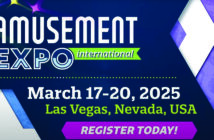The Nevada Experiment
Enacting the Ultimate Oxymoron of “Skill-Based Gambling”

Legal columnist Tom Fricke
by Tom Fricke
[Editor’s note: The state of Nevada appears to be pivoting toward an environment that is friendly to a more entertaining style of “skill gaming.” However, the jury is still out on whether the state’s new legal framework will successfully facilitate a new generation of games that appeal to younger visitors (such as the much-sought-after Millennials).]
Most states that have regulated casinos leave room in their laws for unregulated games for prizes. Nevada doesn’t. Unregulated gambling isn’t a statewide crime under the state’s criminal code. It’s a statewide crime under the state’s Gaming Control Act. The Nevada Gaming Control Board regulates the casinos and slot machine routes. It can’t prosecute an illegal gambling operation in, say, Nye County. But, it can come pretty close to that.
The Nevada Gaming Control Board does have statewide subpoena power and authority to investigate illegal gambling. The Board can request prosecution by county District Attorneys and, upon such officials’ failure to start a prosecution, request the state’s Attorney General to do the dirty work. Would the Attorney General oblige if so requested? Probably.
Las Vegas is in Clark County. That’s where sixty five percent of the state’s residents live. The public policy of the state is memorialized in the following gratuitous legislative act:
The Legislature hereby finds, and declares to be the public policy of this state, that: the gaming industry is vitally important to the economy of the State and the general welfare of the inhabitants.
What surprises many people is that under Nevada law, a game of skill –– any game of skill –– is a “gambling game.” You can go to jail for conducting a “gambling game” in Nevada if you’re not licensed to do so. That applies to your home computer in Nevada and the site that you access to play a skill game (even on a site outside Nevada). It applies every bit as much as it does to your operating unlicensed Cherry 96 in Searchlight or Pahrump.
For avoidance of doubt, here is how the Nevada statute defines a “gambling game” and “gambling”:
“Game” or “gambling game” means any game played with cards, dice, equipment or any mechanical, electromechanical or electronic device or machine for money, property, checks, credit or any representative of value …
“Gaming” or “gambling” means to deal, operate, carry on, conduct, maintain or expose for play any game …”
Yes, I too was in disbelief the first time I read that statute. It isn’t just theoretical. It means that licensees of the Nevada Gaming Commission have a monopoly on all games for prizes delivered by a machine –– any machine. How is it then that for years, limited skill-only redemption has been offered in kids’ arcades in licensed Nevada casinos? The answer is not that skill-only redemption is expressly allowed. The answer is an unhealthy exercise of discretion by the Nevada Gaming Board by informally tolerating something that is expressly illegal.
Last year Nevada grabbed some ink by (1) passing what we call “Senate Bill 9,” (2) by publishing over the signature of the Attorney General of the state, a formal opinion that the conduct of daily fantasy sports contests over the Internet, violates Nevada law, and (3) by enacting the ultimate oxymoron: the Nevada Gaming Control Board’s administrative regulation on “skill-based gambling.”
Since at least 1997, the Nevada Gaming Control Board’s monopoly on all games for prizes had been “crystal clear” (the Attorney General’s term). Legislatures are presumed to never engage in meaningless acts. A statute to render “crystal clear” what is already “crystal clear” by telling the Nevada Gaming Control Board that it can do what it has been allowed to do for more than 18 years, is surprising. Why did they do this?
There are several bases of speculation as to why. Like Cadillac did, Nevada has to respond to an aging clientele. Caesars (nee Harrah’s) is seemingly owner of half of the prime casino properties on Las Vegas Boulevard. With such a casino juggernaut among the casino companies in bankruptcy, and with gaudy-themed, licensed passive slot machine displays no longer effective to hook new gamblers, the answer would seem to be obvious: to legitimize a “pivot” to our form of entertainment as an additional destination-gaming amenity.
There seem to be other reasons, too. There is no better place to hold a convention, title fight or other event, than Las Vegas. Not because of the gaming, but because of the facilities and amenities. We’ve seen tremendous crowds gathered as spectators to skill-only video game tournament competitions. But not in Las Vegas. We have seen video tournament competitors granted travel visas as athletes. We have seen states proposing to legalize daily fantasy sports so that they can tax the activity. But not Nevada, until now. My speculation is that the new law, new regulation and new AG opinion, all of which Nevada produced last year, though unnecessary, are intended to legitimize what could turn out to be a MAJOR pivot.
Do slot machine makers know how to make interactive games that are attractive to skill game players? Maybe not … yet. It’s a matter of talent. But slot machine makers tend to be very rich. Talent and the companies which possess the talented human resources can be bought. We know the wisdom of “every man has his price.”
The coming pivot has its hangups, though. The core business of gaming is the guaranteed profit from games of chance for money. How can the business that depends on that guaranteed profit prosper without it? One way is the pay-to-participate skill tournament in which the sponsor takes a “rake.” But the existing regulations of Nevada gaming and other licensed-gaming jurisdictions are inimical to any form of game for a prize that doesn’t provide that guaranteed profit produced by systematic chance in the means of delivery of the game. It’s also inimical to the way that unregulated skill games are delivered.
Last year, the NGCB changed its regulations and technical standards to purportedly make way for “skill-based gambling.” What remains in the regulations is enough to stump anyone afflicted by visions of sugar plums through development of a Nevada skill game. Here are some examples.
A Nevada gambling machine must guarantee a theoretical return to the player, over time, of 75% of all “coin-in.” The logic board or control program has to be able to produce last-game recall of many prior games. It has to be physically secure, immune to all means of hacking and intrusion and able to produce reports of a scope that is far beyond what you’ll see in any existing skill game. The game can’t be used unless it’s examined by an independent testing laboratory, found by the examination to comply with the technical standards of the Nevada Gaming Control Board. The compliance must be field verifiable by software signature. Any change to the software throws off the signature and triggers a requirement for a re-examination by the independent testing laboratory.
Then, there’s the inconvenient truth that makers and distributors of Nevada “gambling games” have to be licensed. So do their owners, officers and key employees. The process of licensing a new business and its principals is an extremely difficult and expensive process. Because of the to-the-horizon way that Nevada defines a “manufacturer,” these burdens can be cast upon an independent contractor that simply licenses its software to a licensed Nevada slot machine manufacturer.
If you can read and the effort is worth it to you, you can achieve fluency with this scheme of regulations and standards; but for now, the biggest problem is that there are no technical standards around which you can design your product for Nevada. The technical standards remain those written around chance and that guaranteed profit. The November revisions to the NGCB regs and standards basically say, “… and we can allow skill games, too.” Ah, but the quick fix to these overbearing regulations (when applied to skill games) is the part that says, “but we can waive any requirement that we want to.”
That means that if you want to make a skill game for Nevada, you can’t just read the regulation and know what you have to do. You are going to have to consult with the regulator about which requirement of its regulation and technical standard it will consider waiving. Making a skill game for Nevada will be an uncertain and costly endeavor. Those best suited for it will be the manufacturers who are already licensed and who are presumably trusted by the NGCB. These manufacturers may end up going out to acquire the talent that they need. The process could be a spectator sport in its own right. Place your bets!
[Editor’s note: Be sure to read special projects writer Bob Cooney’s great piece on this subject at this link: www.replaymag.com/bob-cooney-on-skill-based-gaming-march-2016/%5D
Attorney Tom Fricke specializes in the law of redemption. He has served the amusement game trade for more than three decades in various roles including in-house counsel for a national FEC chain, trial and transactional attorney for many businesses and as an expert witness on the law of redemption. Tom has also penned hundreds of articles on the subject of redemption regulation, legislation and compliance.
Redemption and the Law is commentary. It is not legal advice. It is intended only to provide useful information on the subject matter covered with the understanding that neither the publisher nor the author is engaged in rendering legal services. If legal advice or other professional or expert assistance is required, the services of a competent professional should be sought. The views expressed in Redemption and the Law are solely those of the author and not the publisher. Author Tom Fricke claims an exclusive trademark in the phrase Redemption and the Law. He can be reached by email at tffricke@aol.com; phone 314/322-9526. © Copyright, Thomas F. Fricke 2016, St. Louis, Missouri, USA. All rights reserved worldwide.



